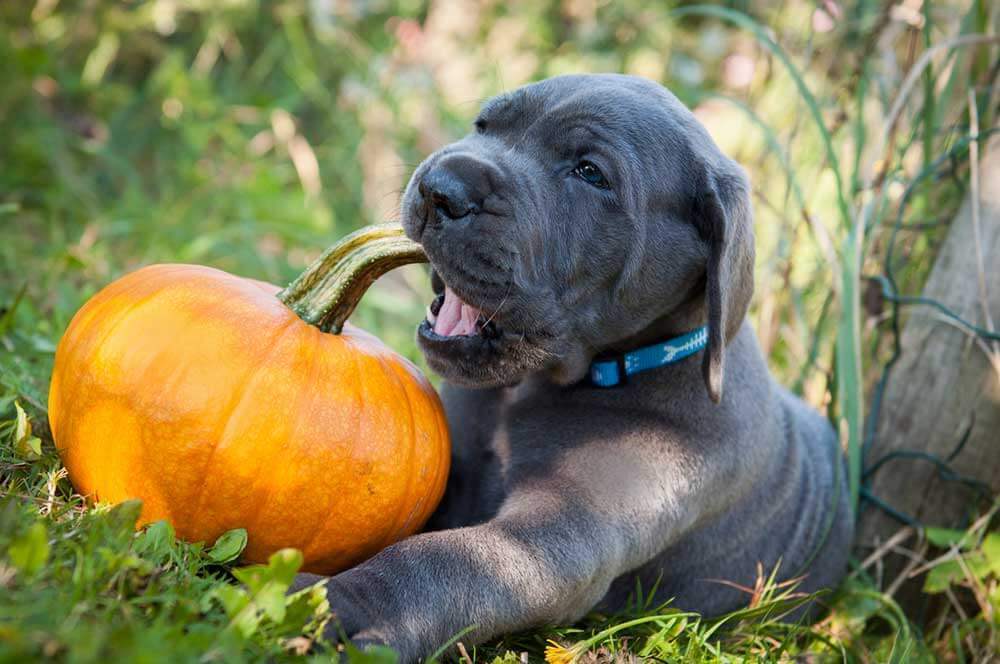As the crisp autumn air arrives, it’s natural to think about the seasonal foods we enjoy, and many pet owners wonder if they can share some of these treats with their furry companions.
Introducing the right seasonal foods into your pet’s diet can offer various health benefits, such as improved digestion, a boost in immune function, enhanced energy levels and more.
However, not all autumn foods are safe for pets, and it is important to know which ones to add, and which to avoid to keep them healthy.
In this guide, we’ll explore which autumn foods are safe for your pets and which should be kept out of their bowls.
Safe Autumn Foods for Pets
Q: Can my pet eat pumpkin?
A: Absolutely! Pumpkin is not only safe for pets but also highly beneficial. It’s packed with fibre, which helps with digestion, and is rich in vitamins A and C. Whether your pet suffers from diarrhea or constipation, plain cooked pumpkin can help balance their gut health. Make sure to give them plain pumpkin, with no added sugars or spices, and steer clear of pumpkin pie fillings.
Q: Do apples make a good treat for pets?
A: Yes, apples make a great autumn snack for pets. They are loaded with vitamins A and C, and their crunchy texture is good for cleaning teeth. However, always remove the seeds and core, as apple seeds contain small amounts of cyanide. Raw apples in small slices are best – avoid feeding your pet sugary apple treats like pie or processed snacks.
Q: Can dogs and cats eat sweet potatoes?
A: Yes, both dogs and cats can safely enjoy plain, cooked sweet potatoes. They are high in dietary fibre, vitamin A, and potassium. Sweet potatoes support a healthy digestive system and provide a sweet, low-fat treat. Be sure to cook them thoroughly, without adding salt, butter, or spices, and serve them in moderation.
Q: What about butternut squash?
A: Yes, butternut squash is another excellent seasonal food for pets. Rich in fibre, vitamins A and C, and potassium, it helps support their digestive health and immune function. Make sure it’s cooked and plain, without any added seasoning, and serve in small amounts.
Q: Are cranberries safe for pets?
A: In moderation, fresh cranberries can be a safe and healthy snack for pets. They are packed with antioxidants, which support urinary tract health. However, avoid giving your pet cranberry sauce or dried cranberries, as these often contain added sugars and preservatives, which can be harmful.
Q: It’s time for roasts – can my pet eat Brussels sprouts?
A: Yes, Brussels sprouts are safe for pets, but in moderation. These little vegetables are full of vitamins C and K, as well as fibre, which promotes digestive health. However, they can cause gas, so start with small portions, and always ensure they are cooked plain without oils or seasoning.
Q: Are pears a good snack for pets?
A: Pears are safe for pets in small quantities. They are rich in fibre and vitamins C and K, making them a nutritious snack. Just like with apples, always remove the seeds and core before offering them to your pet and avoid canned pears or pear syrups.
Q: And carrots?
A: Yes, carrots are an excellent snack for both dogs and cats. They are low in calories, high in fibre, and rich in beta-carotene, which supports eye health. Carrots can be served raw for a crunchy treat or cooked for easier digestion, but either way, they make a healthy addition to your pet’s diet.
Q: Are green beans safe for pets?
A: Yes, green beans are a wonderful low-calorie treat for pets, especially for those watching their weight. Rich in fibre and vitamins like A, C, and K, they support digestion and promote overall health. Be sure to serve them plain, steamed or boiled, and avoid adding any seasoning or fats.
Q: Can dogs eat parsnips?
A: Parsnips are a healthy autumn vegetable for dogs, providing a good source of fibre, folate, potassium, and vitamin C. Cooked parsnips can be added to your dog’s meal to promote digestion and support a strong immune system. Avoid feeding raw parsnips, which can be hard to digest.
Autumn Foods to Avoid for Pets
While there are many healthy, pet-friendly options available in autumn, there are some foods you should avoid giving to your pets:
Onions and Garlic: These can be toxic to pets, causing damage to their red blood cells and leading to anemia. Even small amounts can be harmful.
Grapes and Raisins: These are highly toxic to pets and can lead to kidney failure.
Nuts (especially macadamia nuts): Certain nuts can be harmful to pets, causing vomiting, lethargy, and even neurological symptoms.
Mushrooms: Wild mushrooms can be extremely dangerous, as many are toxic to pets and can cause severe illness or even death.
Spiced or Sugary Foods: Foods containing nutmeg, cinnamon, or sugar should be avoided, as these ingredients can be harmful to your pet’s digestive system.
Chocolate (the kind for human consumption): Chocolate contains two substances that are toxic to dogs: theobromine and caffeine. Unlike humans, dogs metabolise theobromine much more slowly, allowing it to build up to toxic levels in their system.
The Health Benefits of Autumn Foods for Pets
By choosing the right seasonal foods, you can offer your pet a variety of health benefits:
Improved Digestion: Fibre-rich vegetables like pumpkin and sweet potatoes can help regulate your pet’s digestive system.
Stronger Immune System: Foods high in antioxidants, such as cranberries and carrots, can help boost your pet’s immune defences.
Better Skin and Coat: Vegetables rich in vitamins A and C, such as butternut squash and carrots, support healthy skin and coat.
When introducing new foods into your pet’s diet, it’s essential to do so gradually. Start with small portions to ensure they tolerate the food well. Always offer seasonal foods plain, without added sugars, spices, or fats, and remember to consult your vet if your pet has any pre-existing health conditions.
By selecting the right seasonal foods, you can enjoy the beauty of autumn alongside your furry friends, while keeping them healthy and happy!





